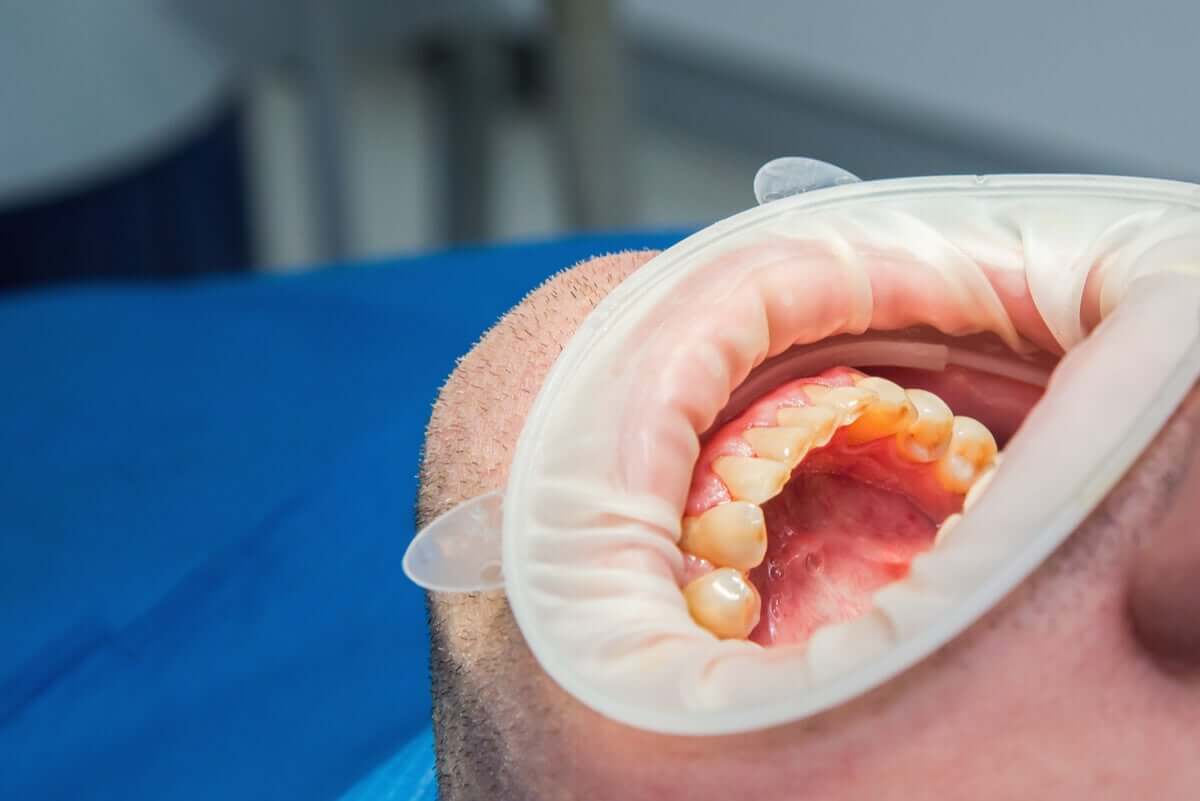6 Side Effects of Excessive Use of Apple Cider Vinegar

Some people are completely unaware of the possible side effects of the excessive use of apple cider vinegar. Although people attribute many health properties to this product, its use in large quantities can lead to unwanted reactions that can even pose a health danger.
So far, there isn’t enough evidence about the safety and efficacy of this natural ingredient. For this reason, although we can include it in our diets, experts recommend a moderate and occasional consumption.
Would you like to find out more about this?
Read on!
What is apple cider vinegar?
Apple cider vinegar is an organic product obtained by combining apples with yeast. During its process, the yeast transforms the sugars of the apples into alcohol. Then, by adding bacteria, the alcohol ferments into acetic acid with a concentration of 5 to 6%.
This acid is classified as a “weak acid” and this is responsible for many of its beneficial effects. However, the product also contains water and other micronutrients.
According to research published in Critical Reviews in Food Science and Nutrition, the acetic acid contained in apple vinegar contributes to lipid metabolism and decreases the risk of obesity and type 2 diabetes. So why shouldn’t it be consumed in excess?

Discover more in this article: 7 Slimming Properties of Apple Cider Vinegar
Side effects of excessive use of apple vinegar
Although known as a healthy product, excessive use of apple cider vinegar can trigger significant side effects. Because of this, you should always take it with caution, avoiding doses that are too high. It’s also best to dilute it in water if possible.
So, what side effects can it have?
1. Apple cider vinegar can delays the emptying of the stomach
Excessive use of apple cider vinegar can worsen the symptomatology of gastroparesis. This is a common condition in people who suffer from type 1 diabetes. It consists of a malfunctioning of the nerves in the stomach, which makes it difficult to empty the stomach.
What happens is that this ingredient slows down the speed with which food leaves the stomach and enters the lower digestive tract. Consequently, it reduces high peaks in blood sugar but also slows the absorption of nutrients into the bloodstream.
Symptoms include the following:
- Nausea
- Heartburn
- Abdominal distention
2. It causes digestive discomfort
Some people find apple cider vinegar to be irritating and to cause stomach upset. Although studies associate acetic acid with an increased sense of satiety, several hypotheses suggest that this effect is a result of indigestion that it causes.
In a controlled study published in the International Journal of Obesity, a group of people consumed a drink containing 25 grams (1 fl oz) of apple vinegar. In the end, they reported less appetite, but also an unpleasant feeling of nausea.
Find all about The Benefits of Drinking Water with Vinegar and Baking Soda Before Meals
3. It’s associated with low potassium levels and bone loss
To date, there aren’t enough controlled studies on the relationship between apple vinegar and blood potassium levels. Neither is there enough research on its supposed link to increased bone loss. However, there is a published case report of such effects.
This case study was published in Nephron, where they reported that a woman who consumed large amounts of apple vinegar, for a prolonged period of time, had to be admitted to the hospital with low potassium levels and alterations in blood chemistry.
The woman consumed about 250 milliliters of apple vinegar diluted in water for over 6 years. The diagnosis showed osteoporosis and leaching of minerals from the bones. Doctors also determined that excess acid could reduce new bone formation.
4. It can cause tooth enamel erosion
Excessive consumption of acidic foods and beverages causes deterioration of tooth enamel. While there’s been more research on the effects of soft drinks and fruit juices, there’s also evidence of damage caused by acetic acid to this coating on the teeth.
A publication in the medical journal Clinical Laboratory states that vinegar can cause a loss of between 1% and 20% of dental minerals after four hours. However, the study was conducted in a laboratory and not in the mouth, where saliva seems to help mitigate acidity.
In any case, the general recommendation is to avoid direct exposure of teeth to undiluted pure apple cider vinegar.
5. It may produce burns in the throat
Excessive use of apple cider vinegar can cause burns to the esophagus. This was the conclusion of a review published in Acta Paediatrica, in which the effects of the consumption of harmful liquids accidentally ingested by children were observed.
Researchers determined that acetic acid from vinegar was the most common acid to cause burns in the throat. Therefore, they called it a “potent caustic substance” that should be kept out of reach of children.

6. It can cause skin burns
Some people claim that the application of apple cider vinegar on the skin has certain benefits. However, its excessive and undiluted application seems to cause the opposite effect.
In a case report published in The Journal of Clinical and Aesthetic Dermatology, a 14-year-old girl suffered damage to her nose after following a protocol seen on the Internet with this product. In another case, a 6-year-old boy suffered burns on his legs after his mother applied apple vinegar to fight an infection.
These risks seem to decrease after diluting the vinegar with water. However, a small test of the product is recommended before using it on large areas of skin.
Overuse of apple cider vinegar
The key to avoiding these unwanted effects of apple cider vinegar is to avoid its excessive use. So far, in moderate amounts, experts consider it safe and beneficial for most people.
However, it’s best to consult a doctor before starting to use it regularly. Remember that it can sometimes interact with medications. Because of this, you should avoid using it if you are currently taking prescribed medicine.
All cited sources were thoroughly reviewed by our team to ensure their quality, reliability, currency, and validity. The bibliography of this article was considered reliable and of academic or scientific accuracy.
- Johnston CS, Gaas CA. Vinegar: medicinal uses and antiglycemic effect. MedGenMed. 2006;8(2):61. Published 2006 May 30.
- Yamashita H. Biological Function of Acetic Acid-Improvement in Obesity and Glucose Tolerance by Acetic Acid in Type 2 Diabetic Rats. Crit Rev Food Sci Nutr. 2016;56 Suppl 1:S171-S175. doi:10.1080/10408398.2015.1045966
-
Liljeberg H, Björck I. Delayed gastric emptying rate may explain improved glycaemia in healthy subjects to a starchy meal with added vinegar. Eur J Clin Nutr. 1998;52(5):368-371. doi:10.1038/sj.ejcn.1600572
- Hlebowicz J, Darwiche G, Björgell O, Almér LO. Effect of apple cider vinegar on delayed gastric emptying in patients with type 1 diabetes mellitus: a pilot study. BMC Gastroenterol. 2007;7:46. Published 2007 Dec 20. doi:10.1186/1471-230X-7-46
- Frost G, Sleeth ML, Sahuri-Arisoylu M, et al. The short-chain fatty acid acetate reduces appetite via a central homeostatic mechanism. Nat Commun. 2014;5:3611. Published 2014 Apr 29. doi:10.1038/ncomms4611
- Darzi J, Frost GS, Montaser R, Yap J, Robertson MD. Influence of the tolerability of vinegar as an oral source of short-chain fatty acids on appetite control and food intake. Int J Obes (Lond). 2014;38(5):675-681. doi:10.1038/ijo.2013.157
-
Lhotta, K., Höfle, G., Gasser, R., & Finkenstedt, G. (1998). Hypokalemia, Hyperreninemia and Osteoporosis in a Patient Ingesting Large Amounts of Cider Vinegar. Nephron, 80(2), 242–243. https://doi.org/10.1159/000045180
- Willershausen I, Weyer V, Schulte D, Lampe F, Buhre S, Willershausen B. In vitro study on dental erosion caused by different vinegar varieties using an electron microprobe. Clin Lab. 2014;60(5):783-790. doi:10.7754/clin.lab.2013.130528
- Feldstein S, Afshar M, Krakowski AC. Chemical Burn from Vinegar Following an Internet-based Protocol for Self-removal of Nevi. J Clin Aesthet Dermatol. 2015;8(6):50.
-
Bunick, C. G., Lott, J. P., Warren, C. B., Galan, A., Bolognia, J., & King, B. A. (2012). Chemical burn from topical apple cider vinegar. Journal of the American Academy of Dermatology, 67(4), e143–e144. https://doi.org/10.1016/j.jaad.2011.11.934
This text is provided for informational purposes only and does not replace consultation with a professional. If in doubt, consult your specialist.








